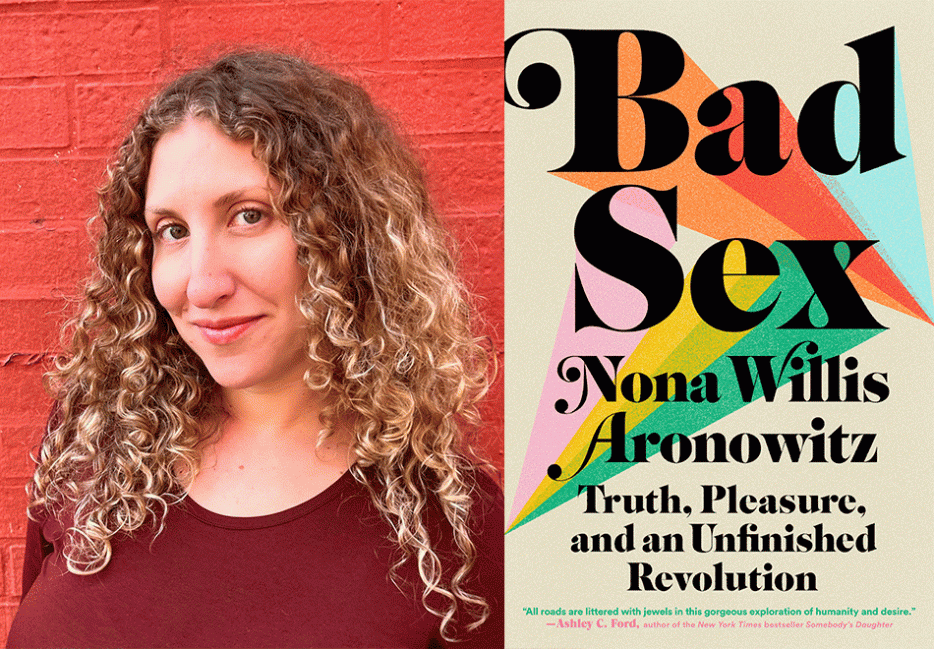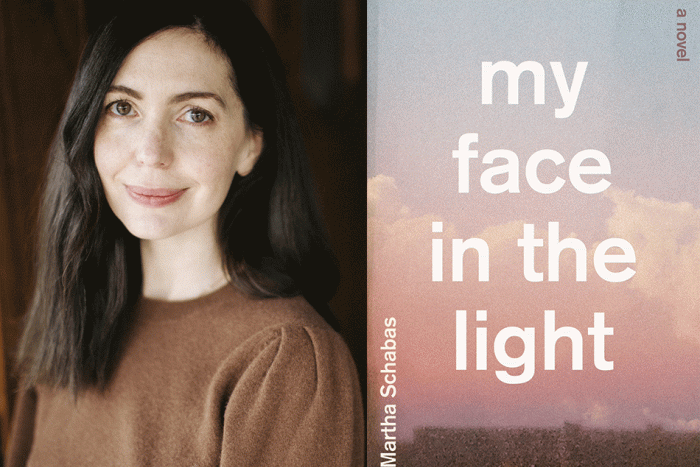My favourite plot twist (spoiler alert!) in Bad Sex (Plume), the new memoir-cum-feminist-history by Nona Willis Aronowitz, is that the chapter “The Real Experts” seems at first to be about heteronormative motherhood, but ends up being about liberation through abortion. My least favourite plot twist about the ongoing cultural politics that Bad Sex documents is that when I first read it earlier this year, abortion was still a constitutional right in America. It’s good to live in a reality in which rigorous personal writing on sex appears on our bookshelves when we need it most, but goddamn, it would be nice if we weren’t always in such dire need of good timing.
Bad Sex is an odyssey through Aronowitz’s life as a slut and a reader. There are as many vivid scenes of her voraciously consuming research in a library as there are of her adventures in dating. The inner life she documents is one that defies the myth of the nymphomaniac: as she searches for meaning through sexual experience, she also documents profound intellectual analysis and complicates everyday human emotions such as annoyance and heartbreak.
Aronowitz uses the stages of her post-divorce sexual escapades as prompts to research topics from race to queerness, from the institution of marriage to the feminist porn wars. A chapter on non-monogamy becomes both an investigation of anarchist Emma Goldman’s relationship to romantic jealousy and a discovery that Nona’s dad cheated on her mom. One of the book’s most refreshing angles is the choice to explore the topic of women’s pleasure by interviewing female clients of male sex workers. All the while, her memoir passages have the refreshing frankness of an early 2010s hookup blog. The prose is infused with natural humour, as when (in the essay on bisexuality, “In It For The Dick”) she concludes that for her, sex with women isn’t “the difference between ‘roller skates and a Ferrari,’” as described by Rita Mae Brown in Rubyfruit Jungle, but “more like being gifted a Ferrari when you don’t have a driver’s license, and anyway, you live a block away from the subway.”
A great deal of sexual scholarship and literature seems devoted to distancing itself from lust to be deemed legitimate. Bad Sex does what more sexuality books should do: prove that our politics can be horny as hell.
Tina Horn: In the essay on reproductive justice in Bad Sex, you tell the story of your own abortion. In this politically catastrophic summer of 2022, what I want to ask is: what is the question you’re most tired of being asked about abortion, and how do you wish we were talking about it instead?
Nona Willis Aronowitz: The biggest a-ha moment I’ve ever had when it comes to abortion was in a Sally Rooney essay about the topic, wherein she points out that in no other circumstance does one human legally have a right to avail themselves of the blood and organs of another human, even in the case of a corpse’s organ donation. So, it really frustrates me when people ask, “Is a fetus a person?” Maybe it is some version of a person—so what? A person does not have the right to take over your uterus and cause permanent changes to your body in order to survive. This point really became vivid when I was pregnant this past year. Now that I’ve met my daughter Doris and experienced her inside my body, it does seem plausible that some parts of her personhood existed before she was born; she had the hiccups every day in the womb and still does, for instance. But as much as I love her and am happy she exists and feel very sad at the thought of her not being here, she still should not have a state-given right to violate my bodily autonomy, whether she’s in utero or earthside.
I appreciate that perspective from a new parent. Speaking as a child-free-and-proud person, the ethical philosophy of abortion is emotionally uncomplicated for me; and feelings influence politics, whether we like it or not. When I read family abolitionist Sophie Lewis (“A key correlate of viewing gestating as labor is that forcing someone to gestate against their will is forced labor”) her ideas make perfect sense to me. The concept of pregnancy as a body horror violation of my autonomy is one of the reasons I’ve never wanted to have children. I like that you understand that, and still welcomed someone to take over your uterus.
Yes—after being pregnant, I’m more sure than ever that having a wanted child is a profound act of generosity. If it’s not wanted, it’s absolutely body horror; and if it is, it’s still frankly body horror (at least for me, it was) but body horror in context of a conscious, joyful invitation.
In its first few chapters, Bad Sex could be read as a divorce memoir. It then morphs into something more slippery: an assessment of sexual politics at large through historical research, cultural criticism, and even an engagement with your mother through her writing. I’m curious if you set out to write something so genre-bendy, or if it started off as one thing and became another? To put it in the language of the book, what were your desires and drives when it came to writing this?
I always knew the book was going to be genre-bendy—the memoir element of my story was so genuinely influenced and informed by history that it would have felt weird to focus too much on my personal story. That said, I discovered new historical touchstones and new family secrets as I got deeper and deeper into my research (and some books, like Angela Chen’s Ace or Jane Ward’s The Tragedy of Heterosexuality, were released in the midst of my writing process). So, there were certainly surprise twists and turns along the way.
It’s funny you mention divorce memoirs, because I definitely think of the first act of my book [as] fitting perfectly into that genre of freedom-seeking through obliterating one’s romantic and domestic life. But my ultimate goal for Bad Sex wasn’t just to end there—it was also to talk about what happens after you take the first step toward freedom, and then realize, “Oh shit, there’s so much more to untangle here.” The institution of marriage is a broken system, but so is the vast world of casual dating and “sex for sex’s sake.”
There’s the promise of pleasure (and the reality of it—I had a lot of wonderful times both in my marriage and afterwards, when I was fucking a ton of people). But there are just so many roadblocks getting in the way of that pleasure, too. I tried very hard to not have a “ride off into the sunset” vibe with any of it.
I like the idea of divorce as a beginning instead of an end: a beginning of unprecedented sexual self-discovery and of the ideological explorations that make up this book. Can you talk more about those roadblocks getting in the way of pleasure, and sex for sex’s sake being a broken system? Do you have a utopian vision of a system of love, sex, and commitment that works?
The roadblocks were multi-layered: They came from all the different messages I’d received; from the traditional patriarchy to my mom’s version of feminism to my own generation’s interpretation of sexual liberation. There are lots of different, often clashing standards of how to be an acceptable sexual woman, and—despite feminism’s history of consciousness-raising and the development of candid female friendship over the last few decades—not enough space to talk about those harmful standards. I found myself having doubts about my marriage and the importance of orgasms and my heterosexuality and my ambivalence about casual sex, and I’d feel embarrassed to vocalize these thoughts even with people (like my pro-sex feminist mom, like my progressive friends) who would ostensibly be receptive to them.
When I say that “sex for sex’s sake” is a broken system, I mean that we still haven’t managed, decades after the 1960s sexual revolution, to solve the problem of quality, not just quantity. Put simply: a lot of casual sex is bad, especially for women. The uncomfortable fact is that good sex usually involves a certain level of vulnerability and surrender from its participants, and yet this quality is often discouraged during casual encounters. Women are told to have their physical and emotional guard up, but a state of self-protection seldom produces the kind of transcendent experiences one may hope for during sex.
I can’t say I have a fully coherent utopian vision of love, sex, and commitment, but I do know that some element of mutual care, empathy, and patience needs to be involved if the sex is going to be worthwhile. This doesn’t mean good sex needs to take place in the context of a committed relationship, but it does mean that people need to be committed to kindness and attunement for the duration of the encounter, at the very least. And I also think that commitment needs to be de-coupled from old-fashioned ideas of monogamy, the source of so much pain in heterosexual relationships especially. Of course, monogamy is fine if it’s actively chosen, but all too often it’s the unspoken default, which not only breeds mistrust and jealousy but can also really get in the way of uncovering one’s true desires.
At the risk of being cringe, I have to tell you that Ellen Willis, your mother, has been one of my heroes since I was very young. Her writing about rock ’n’ roll and sex gave me many a-ha moments, like, “Hey, I too could write professionally about the things I find endlessly fascinating.” I return to her work a lot, including through her anthologies that you edited, when I’m seeking clarity in prose or analysis. Obviously, your relationship to her work has infinitely more layers of meaning. You write about her being there for you through her writing even though she’s gone. How is this book a new stage of the work you began by archiving your mom’s writing? Did the book ever feel like a ghost story?
Writing this book felt really different than putting together her archive or editing those anthologies. This was me really dialoguing with her through her writing, and not always agreeing with her! I’m so glad I’ve preserved her work, but there’s always the danger of inviting hagiography if I don’t also critique and wrestle with my mother’s ideas. And I really grappled with who she was as a person and a mother, not just a writer. She was someone who was fiercely loving and principled, but also at times overly boundaried and extremely hard on herself. Bad Sex feels like, in many ways, my final (and most complex) word on my mother’s work—not that I won’t keep grappling with her love and legacy privately, but I doubt I’ll do another big project that features her work so prominently. So, in some ways, yes, it’s totally a ghost story, because her unfinished business has finally, thoroughly been attended to, and I do feel a sense of peace about it that I didn’t before.
You write about personal sexual situations where your arousal and consent changed, and how the men you were with responded to those changes. I want to ask you about the cultural tension between seduction and consent. It seems to me that consent culture is very attached to the idea that consent is sexy, as if we need to eroticize ethics in order to deserve good treatment. But we also know that wanting or agreeing to have sex with someone and being aroused by them is not the same thing. When other intellectual giants try to grapple with this, they seem to have a lot of issues reconciling desire and safety. We have Camille Paglia’s loathsome assertion that women stay in abusive relationships because the sex is hot, and more recently we have Slavoj Žižek insisting that consent undermines the essential pleasures of seduction. Where do we start reconciling our need for an ethic of consent with the value of lust, and the centrality of power struggle and danger in arousal? What does that have to do with what you identify as the vulnerability paradox?
This is a central question that I’ll probably be asking myself forever, but one thing I can say is this: good sex and the pursuit thereof will never be completely safe. We can’t rely on consent to protect us from potentially dangerous, unpleasant, or painful experiences if we truly surrender to our desires, which can be made up of a whole mess of surprising and politically inconvenient elements. There’s always a possibility that an unsafe experience can be unexpectedly arousing, and we need to make room for that possibility and not blame ourselves or put ourselves down if we experience it.
Regardless of this fact, I do also think it’s worth interrogating where our desires come from. My mother once wrote that some desires of domination, for instance, might be a learned coping mechanism for dealing with pervasive misogyny—which is similar to the recasting involved in BDSM, where the person ostensibly being dominated is actually controlling the whole scenario. I don’t agree that consent kills seduction, but at the same time I think we need to complicate the campus-friendly slogan “consent is sexy.” Consent can be sexy, because it’s great to have sex with someone who’s attuned to your desires and cares about your pleasure. But desires are culturally constructed, so that means that they’ll often clash with the politics we have in the light of day, including our views on consent.
I feel like American media is becoming more repressed than ever about sex. Have you found that to be true? Why is it so hard to sell a project about sex? What obstacles did you face in getting this book made? Asking for a friend! (It’s me. The friend is me.)
I wouldn’t say that American media is more repressed about sex than in the past, but it’s certainly not a time of great expansiveness when it comes to sexual freedom. And there’s definitely been some backlash to the idea of “sex positivity” on the heels of #MeToo. On one hand I sympathize—as I make clear in my book, consensual sex can still be unsatisfying or straight-up bad. But the recent handwringing over dismal dating-app experiences and porn also worries me, because along with critiques we should be articulating joyful alternatives besides just committed relationships, which as we know have their own toxic traps. I went out of my way in this book to describe moments of joy, surrender, and pleasurable surprise (regardless of whether they were with someone I loved or wanted to commit to) because those things can still happen even in the context of an imperfect system! Those moments are what we should be reaching toward and cultivating, not retreating into the solutions of the past or designing narrower lives for ourselves.
In terms of selling projects about sex, I actually think it’s slightly better than it was just a few years ago. I was selling Bad Sex right after the blockbuster success of Lisa Taddeo’s Three Women, which gave me an opportunity to say, “See? People really do care about women’s erotic lives!” And since I got that book deal, thoughtful books about sex like Tracy Clark-Flory’s Want Me or Amia Srinivasan’s The Right to Sex have done really well.
That said, I did face a lot of rejection from publishers, though their letdown letters were often less focused on the sex element than the genre-bending element. And I do get the general sense that some media/publishing gatekeepers still think of narratives around sex as not “prestigious” or “serious.” Also—and this isn’t only true in media but—it frustrates me so much that straight men have basically cut themselves out of this conversation completely! Very few straight male editors and writers engage with these types of books, even though they’re often the subject of them, and that’s a huge problem.
What’s the deal with straight men divesting from the discourse? What would you like them to do differently? I can’t believe I’m saying this, but I learned the most from your book in the chapter about men: woke misogynists, success objects, MRAs, men’s lib, etc. You portray your struggle with having boundaries versus being a doormat, how to give men the benefit of the doubt for their good intentions while also having standards. What have you learned about trusting men while we’re all simmering in the broth of the patriarchy?
This is very delicate, because every time a straight man attempts to write about sex or relationships, a lot of people yell at him on the internet. But we need men to be more vulnerable about their desires, too, both through writing and in their everyday lives. At its best, that’s what the men’s liberation movement of the ’70s was about: stripping men of their many, many layers of pretense and self-protection. Since this book, I’ve become very good at sniffing out men who want to at least try to be vulnerable. The men who admit they don’t necessarily know the answers, who want to explore alongside you rather than facilitate your exploration, men who are patient and don’t appear to have a particular agenda—those are the men I now trust. Nowadays, if I stumbled upon that woke misogynist I write about in my book, my spidey sense would have gone off sooner, because he was just too confident! And too eager to be in control of the whole situation. I know lots of women are attracted to confidence and control, and that’s cool, but if you ask me it’s very hard for men to pull those things off and earn my trust.
One of my favorite Ellen Willis quotes is, “In practice, attempts to sort out good erotica from bad porn inevitably come down to ‘What turns me on is erotic; what turns you on is pornographic.’” I often use this to expose the (usually classist) hypocrisy in anti-porn rhetoric. I love that you’re building on your mom’s feminist response to pornography, especially your critique of Robin Morgan’s notion that the difference between hardcore masculine lust and softcore feminine romance is self-evident. (“‘Every woman here knows in her gut,’ wrote Robin Morgan in 1978, ‘that the emphasis on genital sexuality, objectification, promiscuity, emotional noninvolvement, and coarse invulnerability, as the male style, and that we, as women, placed greater trust in love, sensuality, humor, tenderness, commitment.’” To which you hilariously responded, “Other women’s guts begged to differ.”) Can you speak more on complicating the analogy of “porn is to erotica as male sexuality is to female sensuality”?
I love that Ellen Willis quote, too! I felt a little self-conscious about not delving too much into porn in this book, even though I actually know a huge amount about the feminist porn wars. Ultimately, I didn’t feel like porn was a huge part of my sexuality, and it also seemed like lots of other writers were already covering how internet porn affects the youngest generations.
But yes, I am fascinated with this fallacy of aggressive male sexuality versus softer female sensuality, a dichotomy I do see creeping back into people’s critiques of modern dating. I’m the sex advice columnist for Teen Vogue, so I’m privy to a lot of young female fantasies, and they’re all over the map—they really do not fit into one category or the other. I do think kindness and some measure of vulnerability figures into what most women (people, really) want sexually, but that can look all kinds of ways. Intense BDSM, when done right, certainly incorporates elements of both. Even more, anonymous, “unattached” sex can be a fulfilling, humanizing experience if you choose to make it so. I tell an anecdote in the book about a one-night stand I had in Texas with a seemingly conventional, not very sexually sophisticated guy, but he was curious and present and he didn’t want to totally orchestrate the situation. Which made our all-night fuckfest a really pleasant experience, one that didn’t fit into any rigid category of “hardcore” versus “softcore.”
In your essay on race and “The Vulnerability Gradient,” you discuss “the violence of the archive,” or “archival silence.” Do you see your work as an affront to that violence and silence?
Honestly, when it comes to feminist sexual liberation, straight white women have had the most space to opine and the most latitude to participate—so I don’t think that my story directly remedies archival silence. That’s why I wanted to include a chapter that deliberately centred the narrative on a different story: [that of] my friend Selah, a Black queer woman whose journey gets told far, far less. I believe the particulars of my story are important and worthwhile, but as I wrote this book it began to seem like the elephant in the room that I kept quoting and profiling other straight, white women because they really took up the most space when it came to sexual freedom narratives, at least explicitly feminist ones. So, I did try to include other stories from women of colour and queer women, too.
Why do we fight so much about what IS feminist? Do you see a resolution to this in our future?
I think, thankfully, that question has actually become less relevant as the years go on; I do feel that the pressure to be some feminist orgasm goddess is loosening a bit. There are always going to be culturally imposed standards for sex, though, which is super annoying—I feel a certain amount of pressure to be “embodied” or “mindful” with my sex thanks to Instagram and sexual wellness companies. The closest to a resolution I come up with in the book is that any movement’s standard is always going to be reductive and kind of judgy by design, which runs the risk of alienating the very people they want to recruit. Feminism is wonderful in so many ways, but there are serious limits to how much it can and should dictate your intimate life. Once I realized and accepted that and gave myself space to grow and surprise myself, things felt a lot more hopeful.






